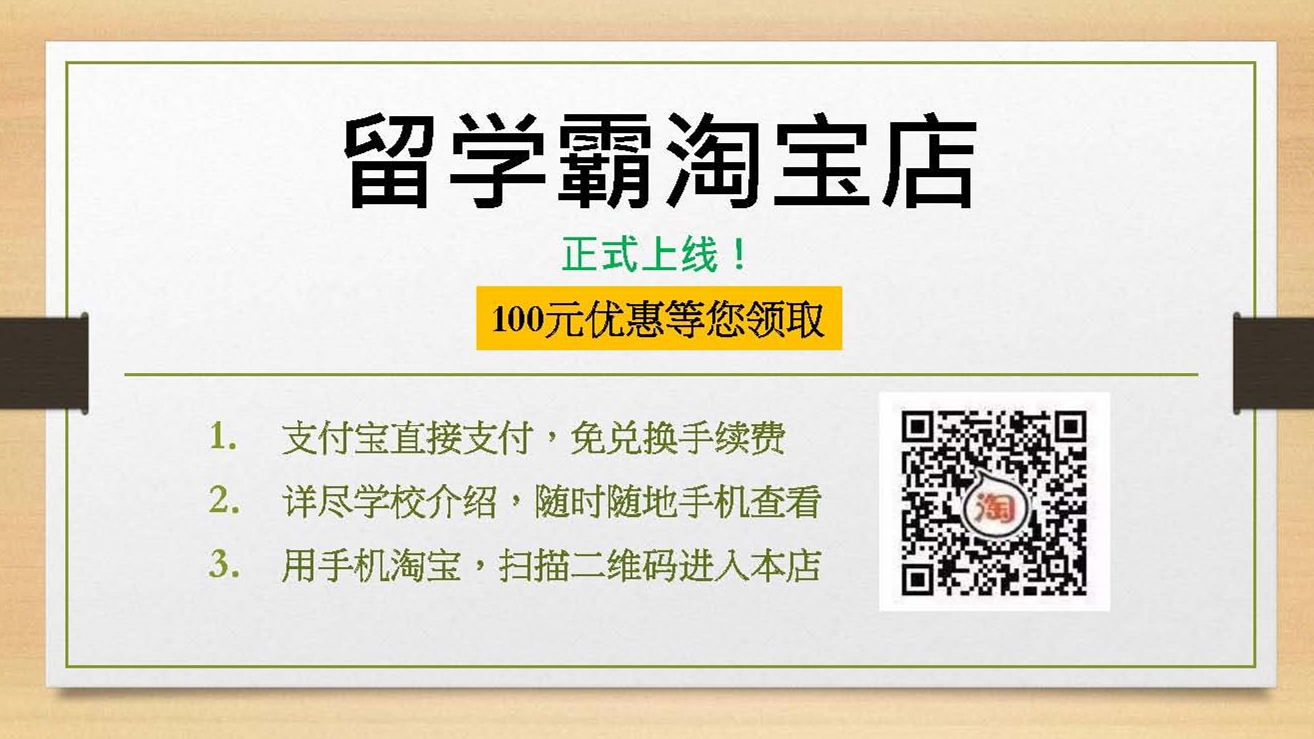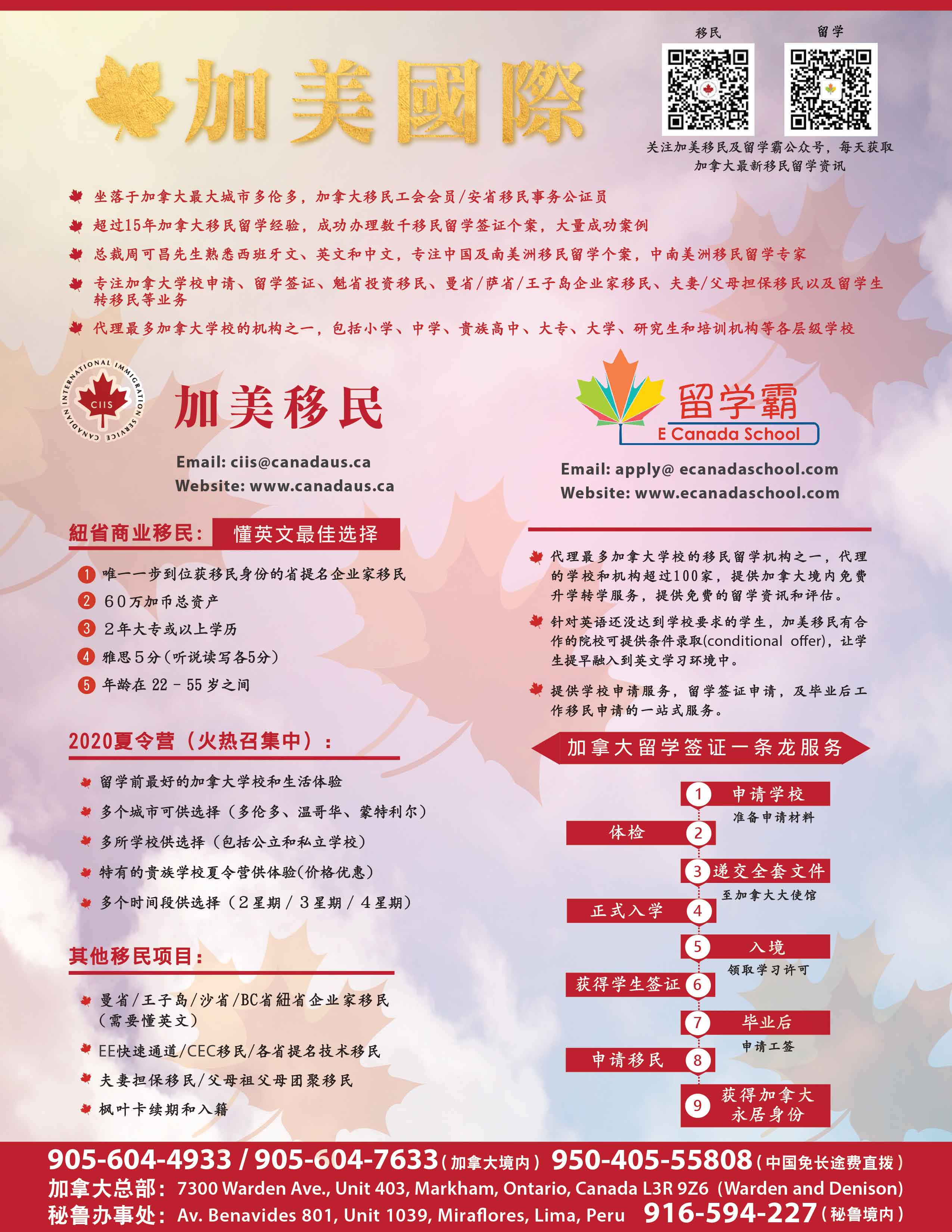Scan


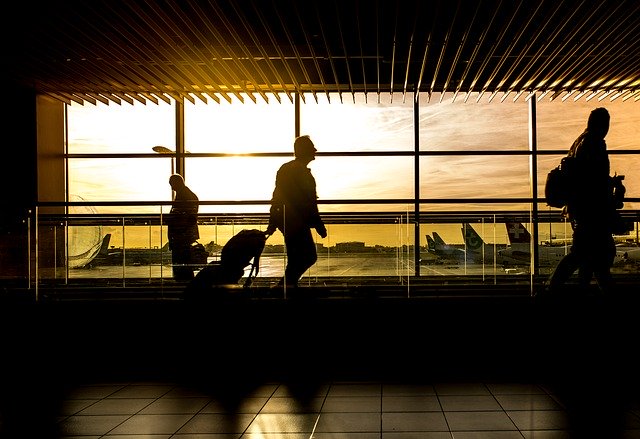
Until further notice, most people can’t travel to Canada, even if they have a valid visitor visa or electronic travel authorization (eTA). Some people may still be able to travel to Canada if they’re exempt from the travel restrictions and coming for an essential purpose.
So we can keep processing applications from people who are exempt from the travel restrictions, we’re temporarily changing how you can apply to visit, work or study in Canada.
Between April 9 and 29, 2020, the application process will change for
visitor visas (including transit visas)
eTAs
study permits
work permits
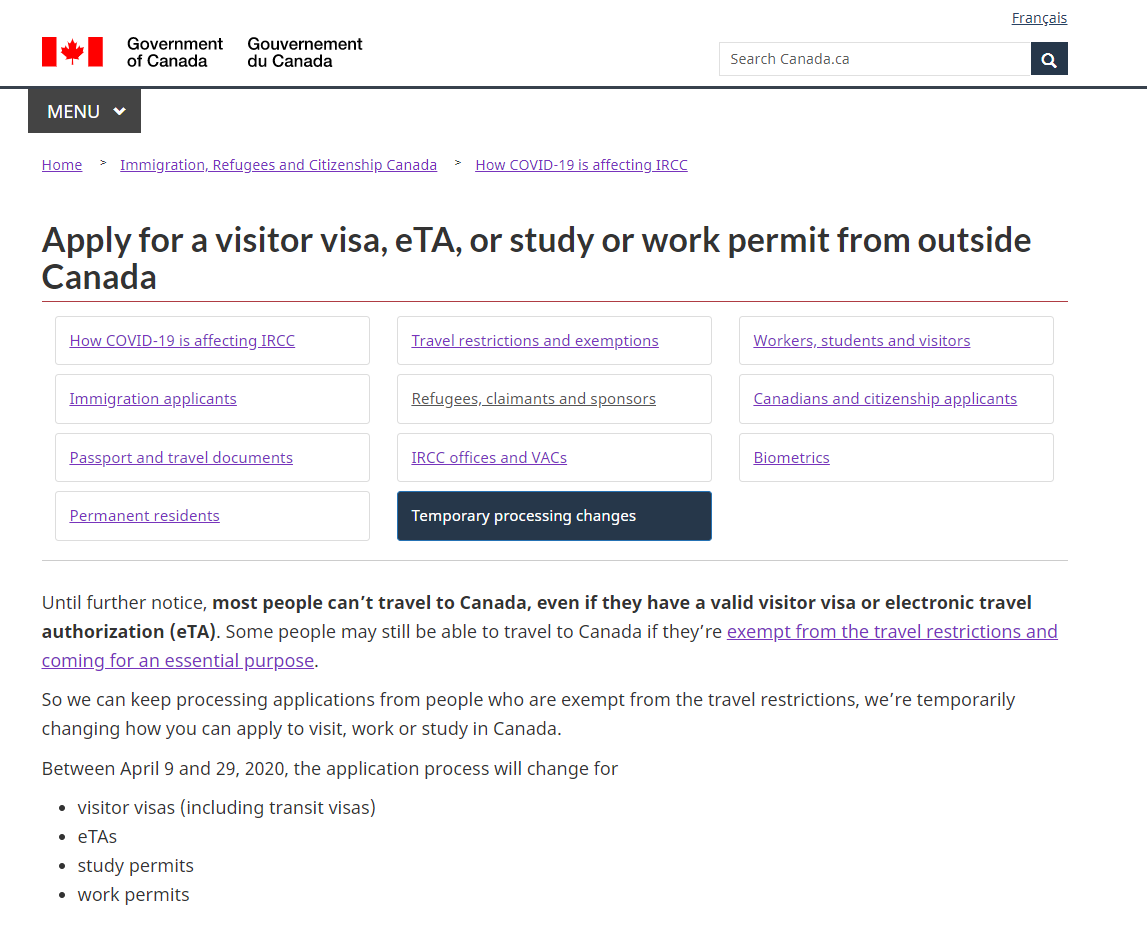

If you already applied for a visitor visa

Step 1: Email us at IRCC.COVID-TravelExemptions-Exemptionsdevoyage-COVID.IRCC@cic.gc.ca to tell us
you’re exempt from the travel restrictions
you need to travel for an essential purpose
you have an application in process
how you applied for your visa—online or by paper
Step 2: When emailing us, make sure you give us the following information:
your application number
your unique client identifier (UCI) number
where you live now (current country of residence)
how you meet one of the exemption criteria
evidence that you meet this exemption (provide proof as an attachment in your email)
For example, if you qualify as an immediate family member of a Canadian citizen or Canadian permanent resident, you can provide one of the following:
a letter of support from your family member
your birth certificate
your marriage licence
a letter from your spouse, partner or parent
why you need to travel to Canada for an essential purpose
although it’s not recommended that you book travel before you get your visa, if you’ve booked travel, provide your travel itinerary, including your
flight number
departing time and location
arrival time and location
Step 3: You’ll receive an email, via your IRCC Secure Account, confirming if your application is approved or refused, or requesting more information so we can make a decision. If you’ve not been able to give your biometrics due to a service disruption, please note that applicants are now being given 90 days instead of 30 to complete this step. Find out more information on giving biometrics.
If your application is approved, we’ll tell you the next steps in the process.
If you originally applied for a visitor visa by paper, you can link your application to an online account. In your online account, you can see the status of your application and receive messages about your application.
Your application won’t be processed until the pause is lifted if
you don’t meet one of the exemption criteria
an officer determines that you’re not travelling for an essential purpose
Step 4: You need to prepare properly before arriving at the airport to fly to Canada.
Important: You must bring evidence (see step 2) that you meet one of the exemption criteria and that you are travelling for an essential purpose. If you can’t provide this information, you won’t be allowed to board your flight to Canada.
Airline officials will be conducting a health check, and anyone showing symptoms of COVID-19 won’t be able to board their flight to Canada.
Step 5: When you arrive in Canada, we’ll assess your health before you leave the airport. You must isolate for 14 days, even if you have no symptoms. This is mandatory.
You must have a plan to isolate when you arrive in Canada. If you do not have a plan, you will need to delay travel until you have one.
If you already applied for an eTA but haven’t heard back about next steps

Step 1: Send us a Web form to tell us you’re exempt from the travel restrictions and why your travel is essential.
Step 2: When filling out the Web form, do the following:
From the drop-down menu, under Type of application/enquiry, select “Electronic Travel Authorization” and then “Case Specific Enquiries.”
In the text box, tell us that you already applied for an eTA and explain how you meet one of the exemption criteria, and why you are travelling to Canada for an essential purpose.
Step 3: When you’ve filled out the form, make sure you do the following:
Answer “yes” to the question Would you like to include a document with your submission?, and then upload evidence that you meet one of the exemption criteria.
The type of evidence you need to provide depends on which criterion you qualify for. For example, if you qualify as an immediate family member of a Canadian citizen or Canadian permanent resident, you can provide
a letter of support from your family member
your birth certificate
your marriage licence
a letter from your spouse, partner or parent
Step 4: Once an officer is satisfied that you meet one of the necessary exemption criteria, based on the evidence you have submitted, you’ll receive an email from IRCC with the next steps.
Step 5: You need to prepare properly before arriving at the airport to fly to Canada.
Important: you must bring evidence (see step 3) that you meet one of the exemption criteria and that you’re travelling for an essential purpose. If you can’t provide this information, you will not be allowed to board your flight to Canada.
Airline officials will be conducting a health check, and anyone showing symptoms of COVID-19 will not be able to board their flight to Canada.
Step 6: When you arrive in Canada, we’ll assess your health before you leave the airport. You must isolate for 14 days, even if you have no symptoms. This is mandatory.
You must have a plan to isolate when you arrive in Canada. If you do not have a plan, you will need to delay travel until you have one.
If you need to apply for a visitor visa

While these temporary changes are in effect, we’ll process your visitor visa application only if
you qualify for an exemption from the travel restrictions
your travel to Canada is essential
You also must meet all regular visitor visa eligibility and admissibility requirements.
When you apply for a visitor visa
For us to prioritize and process your application, you must self-identify on the application form that you qualify for an exemption.
Step 1: If you need a visitor visa to travel to Canada, you must apply online for one. Only online applications will be accepted and processed.
Step 2: When answering the question on the application form about the purpose of travel, enter the following information exactly as written to ensure your application is prioritized:
For question 1 a) purpose of travel, choose “other” from the drop-down menu.
For question 1 b) description field, write “COVID-19” exactly like this (you must use capital letters).
Step 3: Pay the application fee and submit all required supporting documents, including giving biometrics. Please note that as a special measure due to COVID-19, applicants who need to give biometrics are now being given 90 days instead of 30 to complete this step. Find out more information on giving biometrics.
Step 4: You must provide evidence that you meet one of the travel restriction exemption criteria and are travelling for an essential purpose. The type of evidence you need to provide depends on which criterion you qualify for.
For example, if you qualify as an immediate family member of a Canadian citizen or Canadian permanent resident, you can provide one of the following:
a letter of support from your family member
your birth certificate
your marriage licence
a letter from your spouse, partner or parent
Step 5: You’ll receive an email confirming if your application is approved or refused, or you may receive a letter requesting more information, so we can make a decision. This will be sent to your IRCC Secure Account. If your application is approved, we’ll tell you the next steps in the process.
Your application won’t be processed until the pause is lifted if
you don’t meet one of the exemption criteria
an officer determines that you’re not travelling for an essential purpose
Step 6: You need to prepare properly before arriving at the airport to fly to Canada.
Important: You must bring evidence (see step 4) that you meet one of the exemption criteria. If you can’t provide this information, you won’t be allowed to board your flight to Canada.
Airline officials will be conducting a health check, and anyone showing symptoms of COVID-19 will not be able to board their flight to Canada.
Step 7: When you arrive in Canada, we’ll assess your health before you leave the airport. You must isolate for 14 days, even if you have no symptoms. This is mandatory.
You must have a plan to isolate when you arrive in Canada. If you do not have a plan, you will need to delay travel until you have one.
If you need to apply for an eTA

Step 1: You’ll need to apply online for an eTA.
Step 2: After you apply, send us a Web form to tell us you’re exempt from the travel restrictions, and you’re travelling for an essential purpose.
Step 3: When filling out the Web form, do the following:
From the drop-down menu, under Type of application/enquiry, select “Electronic Travel Authorization,” and then “Case Specific Enquiries.”
In the text box, tell us you’ve applied for an eTA and explain how you meet one of the exemption criteria.
Step 4: When you’ve filled out the form, make sure you do the following:
Answer “yes” to the question Would you like to include a document with your submission?, and then upload evidence that you meet one of the exemption criteria and evidence that you’re travelling for an essential purpose.
The type of evidence you need to provide depends on which criterion you qualify for. For example, if you qualify as an immediate family member of a Canadian citizen or Canadian permanent resident, you can provide
a letter of support from your family member
your birth certificate
your marriage licence
a letter from your spouse, partner or parent
Step 5: If your eTA is automatically approved, you’ll receive an approval email with the details of your eTA.
If your eTA is not automatically approved, you’ll receive an email with next steps.
Step 6: You need to prepare properly before arriving at the airport to fly to Canada.
Important: You must bring evidence (see step 4) that you meet one of the exemption criteria and that you’re travelling for an essential purpose. If you can’t provide this information, you won’t be allowed to board your flight to Canada.
Airline officials will be conducting a health check, and anyone showing symptoms of COVID-19 won’t be able to board their flight to Canada.
Step 7: When you arrive in Canada, we’ll assess your health before you leave the airport. You must isolate for 14 days, even if you have no symptoms. This is mandatory.
You must have a plan to isolate when you arrive in Canada. If you do not have a plan, you will need to delay travel until you have one.
Apply for a study or work permit
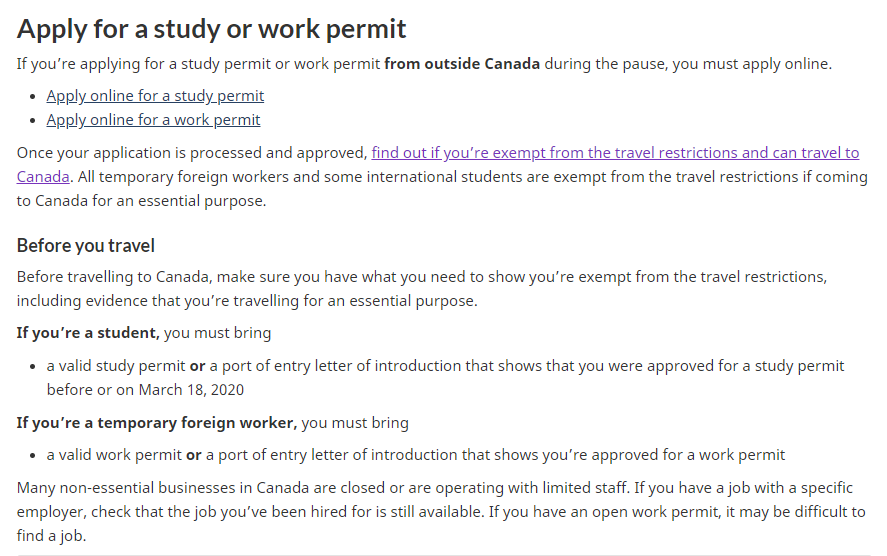
If you’re applying for a study permit or work permit from outside Canada during the pause, you must apply online.
Once your application is processed and approved, find out if you’re exempt from the travel restrictions and can travel to Canada. All temporary foreign workers and some international students are exempt from the travel restrictions if coming to Canada for an essential purpose.
Before you travel
Before travelling to Canada, make sure you have what you need to show you’re exempt from the travel restrictions, including evidence that you’re travelling for an essential purpose.
If you’re a student, you must bring
a valid study permit or a port of entry letter of introduction that shows that you were approved for a study permit before or on March 18, 2020
If you’re a temporary foreign worker, you must bring
a valid work permit or a port of entry letter of introduction that shows you’re approved for a work permit
Many non-essential businesses in Canada are closed or are operating with limited staff. If you have a job with a specific employer, check that the job you’ve been hired for is still available. If you have an open work permit, it may be difficult to find a job.
Airline officials will be conducting a health check, and anyone showing symptoms of COVID-19 will not be able to board their flight to Canada.
When you arrive in Canada:
We’ll assess your health before you leave the airport.
You must isolate for 14 days, even if you have no symptoms. This is mandatory.
You must have a plan to isolate when you arrive in Canada. If you do not have a plan, you will need to delay travel until you have one.
